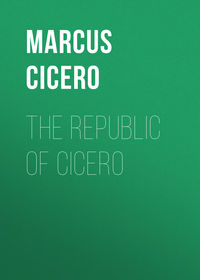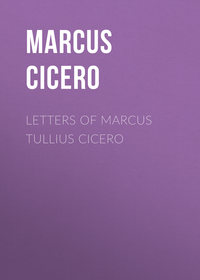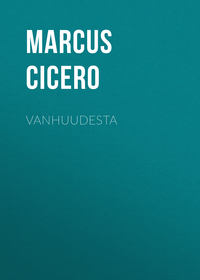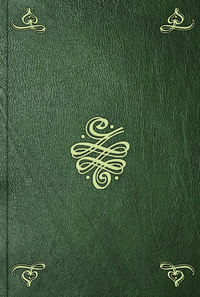 полная версия
полная версияThe Orations of Marcus Tullius Cicero, Volume 4
XIII. Isocrates lived in the age next to theirs; who is at all times praised by us above all other orators of his class, even though you, O Brutus, sometimes object in a jesting though not in an unlearned spirit. But you will very likely agree with me when you know why I praise him. For as Thrasymachus appeared to him to be too concise with his closely measured rhythm, and Gorgias also, though they are the first who are said to have laid down any rules at all for the harmony of sentences; and as Thucydides was somewhat too abrupt and not sufficiently round, if I may use such an expression; he was the first who adopted a system of dilating his ideas with words, and filling them up with better sounding sentences; and as by his own practice he formed those men who were afterwards accounted the most eminent men in speaking and writing, his house got to be reckoned a perfect school of eloquence. Therefore, as I, when I was praised by our friend Cato, could easily bear to be blamed by the rest; so Isocrates appears to have a right to despise the judgment of other men, while he has the testimony of Plato to pride himself on. For, as you know, Socrates is introduced in almost the last page of the Phaedrus speaking in these words:—"At present, O Phaedrus, Isocrates is quite a young man; but still I delight in telling the expectations which I have of him." "What are they?" says he. "He appears to me to be a man of too lofty a genius to be compared to Lysias and his orations: besides, he has a greater natural disposition for virtue; so that it will not be at all strange if, when he has advanced in age, he will either surpass all his contemporaries who turn their attention to eloquence, and in this kind of oratory, to the study of which he is at present devoted, as if they were only boys; or, if he is not content with such a victory, he will then feel some sort of divine inspiration prompting him to desire greater things. For there is a deep philosophy implanted by nature in this man's mind." This was the augury which Socrates forms of him while a young man. But Plato writes it of him when he has become an old man, and when he is his contemporary, and a sort of attacker of all the rhetoricians. And Isocrates is the only one whom he admires. And let those men who are not fond of Isocrates allow me to remain in error in the company of Socrates and Plato.
That then is a delightful kind of oratory, free, fluent, shrewd in its sentiments, sweet sounding in its periods, which is found in that demonstrative kind of speaking which we have mentioned. It is the peculiar style of sophists; more suitable for display than for actual contest; appropriate to schools and exhibitions; but despised in and driven from the forum. But because eloquence is first of all trained by this sort of food, and afterwards gives itself a proper colour and strength, it appeared not foreign to our subject to speak of what is as it were the cradle of an orator. However, all this belongs to the schools, and to display: let us now descend into the battle-field and to the actual struggle.
XIV. As there are three things which the orator has to consider; what he is saying; and in what place, and in what manner he is saying each separate thing; it seems on all accounts desirable to explain what is best as to each separate subject, though in rather a different manner from that in which it is usually explained in laying down the principles of the science. We will give no regular rules, (for that task we have not undertaken,) but we will present an outline and sketch of perfect eloquence; nor will we occupy ourselves in explaining by what means it is acquired, but only what sort of thing it appears to us to be.
And let us discuss the two first divisions very briefly. For it is not so much that they have not an important reference to the highest perfection, as that they are indispensable, and almost common to other studies also. For to plan and decide on what you will say are important points, and are as it were the mind in the body; still they are parts of prudence rather than of eloquence; and yet what matter is there in which prudence is not necessary? This orator, then, whom we wish to describe as a perfect one, must know all the topics suited to arguments and reasons of this class. For since whatever can possibly be the subject of any contest or controversy, gives rise to the inquiry whether it exists, and what it is, and what sort of thing it is; while we endeavour to ascertain whether it exists, by tokens; what it is, by definitions; what sort of thing it is, by divisions of right and wrong; and in order to be able to avail himself of these topics the orator,—I do not mean any ordinary one, but the excellent one whom I am endeavouring to depict,—always, if he can, diverts the controversy from any individual person or occasion. For it is in his power to argue on wider grounds concerning a genus than concerning a part; as, whatever is proved in the universal, must inevitably be proved with respect to a part. This inquiry, then, when diverted from individual persons and occasions to a discussion of a universal genus, is called a thesis. This is what Aristotle trained young men in, not after the fashion of ordinary philosophers, by subtle dissertations, but in the way of rhetoricians, making them argue on each side, in order that it might be discussed with more elegance and more copiousness; and he also gave them topics (for that is what he called them) as heads of arguments, from which every sort of oration might be applied to either side of the question.
XV. This orator of ours then (for what we are looking for is not some declaimer out of a school, or some pettifogger from the forum, but a most accomplished and perfect orator), since certain topics are given to him, will run through all of them; he will use those which are suitable to his purpose according to their class; he will learn also from what source those topics proceed which are called common. Nor will he make an imprudent use of his resources, but he will weigh everything, and make a selection. For the same arguments have not equal weight at all times, or in all causes. He will, therefore, exercise his judgment, and he will not only devise what he is to say, but he will also weigh its force. For there is nothing more fertile than genius, especially of the sort which has been cultivated by study. But as fertile and productive corn-fields bear not only corn, but weeds which are most unfriendly to corn, so sometimes from those topics there are produced arguments which are either trifling, or foreign to the subject, or useless; and the judgment of the orator has great room to exert itself in making a selection from them. Otherwise how will he be able to stop and make his stand on those arguments which are good and suited to his purpose? or how to soften what is harsh, and to conceal what cannot be denied, and, if it be possible, entirely to get rid of all such topics? or how will he be able to lead men's minds away from the objects on which they are fixed, or to adduce any other argument which, when opposed to that of his adversaries, may be more probable than that which is brought against him?
And with what diligence will he marshal the arguments with which he has provided himself? since that is the second of his three objects. He will make all the vestibule, if I may so say, and the approach to his cause brilliant; and when he has got possession of the minds of his hearers by his first onset, he will then invalidate and exclude all contrary arguments; and of his own strongest arguments some he will place in the van, some he will employ to bring up the rear, and the weaker ones he will place in the centre.
And thus we have described in a brief and summary manner what this perfect orator should be like in the two first parts of speaking. But, as has been said before, in these parts, (although they are weighty and important,) there is less skill and labour than in the others.
XVI. But when he has found out what to say, and in what place he is to say it, then comes that which is by far the most important division of the three, the consideration of the manner in which he is to say it. For that is a well-known saying which our friend Carneades used to repeat:—"That Clitomachus said the same things, but that Charmadas said the same things in the same manner." But if it is of so much consequence in philosophy even, how you say a thing, when it is the matter which is looked at there rather than the language, what can we think must be the case in causes in which the elocution is all in all? And I, O Brutus, knew from your letters that you do not ask what sort of artist I think a consummate orator ought to be, as far as devising and arranging his arguments; but you appeared to me to be asking rather what kind of eloquence I considered the best. A very difficult matter, and, indeed, by the immortal gods! the most difficult of all matters. For as language is a thing soft and tender, and so flexible that it follows wherever you turn it, so also the various natures and inclinations of men have given rise to very different kinds of speaking.
Some men love a stream of words and great volubility, placing all eloquence in rapidity of speech. Others are fond of distinct and broadly marked intervals, and delays, and taking of breath. What can be more different? Yet in each kind there is something excellent. Some labour to attain a gentle and equable style, and a pure and transparent kind of eloquence; others aim at a certain harshness and severity in their language, a sort of melancholy in their speech: and as we have just before divided men, so that some wish to appear weighty, some light, some moderate, so there are as many different kinds of orators as we have already said that there are styles of oratory.
XVII. And since I have now begun to perform this duty in a more ample manner than you did require it of me, (for though the question which you put to me has reference only to the kind of oration, I have also in my answer given you a brief account of the invention and arrangement of arguments,) even now I will not speak solely of the manner of making a speech, but I will touch also on the manner of conducting an action. And so no part whatever will be omitted: since nothing need be said in this place of memory, for that is common to many arts.
But the way in which it is said depends on two things,—on action and on elocution. For action is a sort of eloquence of the body, consisting as it does of voice and motion. Now there are as many changes of voice as there are of minds, which are above all things influenced by the voice. Therefore, that perfect orator which our oration has just been describing, will employ a certain tone of voice regulated by the way in which he wishes to appear affected himself, and by the manner also in which he desires the mind of his hearer to be influenced. And concerning this I would say more if this was the proper time for laying down rules concerning it, or if this was what you were inquiring about. I would speak also of gesture, with which expression of countenance is combined. And it is hardly possible to express of what importance these things are, and what use the orator makes of them. For even people without speaking, by the mere dignity of their action, have often produced all the effect of eloquence; and many really eloquent men, by their ungainly delivery have been thought ineloquent. So that it was not without reason that Demosthenes attributed the first, and second, and third rank to action. For if eloquence without action is nothing, but action without eloquence is of such great power, then certainly it is the most important part of speaking.
XVIII. He, then, who aims at the highest rank in eloquence, will endeavour with his voice on the stretch to speak energetically; with a low voice, gently, with a sustained voice, gravely, and with a modulated voice, in a manner calculated to excite compassion.
For the nature of the voice is something marvellous, for all its great power is derived from three sounds only, the grave sound, the sharp sound, and the moderate sound, and from these comes all that sweet variety which is brought to perfection in songs. But there is also in speaking a sort of concealed singing, not like the peroration of rhetoricians from Phrygia or Caria, which is nearly a chant, but that sort which Demosthenes and Aeschines mean when the one reproaches the other with the affected modulation of his voice. Demosthenes says even more, and often declares that Aeschines had a very sweet and clear voice. And in this that point appears to me worth noting, with reference to the study of aiming at sweetness in the voice. For nature of herself, as if she were modulating the voices of men, has placed in every one one acute tone, and not more than one, and that not more than two syllables back from the last, so that industry may be guided by nature when pursuing the object of delighting the ears. A good voice also is a thing to be desired, for it is not naturally implanted in us, but practice and use give it to us. Therefore, the consummate orator will vary and change his voice, and sometimes straining it, sometimes lowering it, he will go through every degree of tone.
And he will use action in such a way that there shall be nothing superfluous in his gestures. His attitude will be erect and lofty, the motion of the feet rare, and very moderate, he will only move across the tribune in a very moderate manner, and even then rarely, there will be no bending of the neck, no clenching of the fingers, no rise or fall of the fingers in regular time, he will rather sway his whole body gently, and employ a manly inclination of his side, throwing out his arm in the energetic parts of his speech, and drawing it back in the moderate ones. As to his countenance, which is of the greatest influence possible next to the voice, what dignity and what beauty will be derived from its expression! And when you have accomplished this, then the eyes too must be kept under strict command, that there may not appear to be anything unsuitable, or like grimace. For as the countenance is the image of the mind, so are the eyes the informers as to what is going on within it. And their hilarity or sadness will be regulated by the circumstances which are under discussion.
XIX. But now we must give the likeness of this perfect orator and of this consummate eloquence, and his very name points out that he excels in this one particular, that is to say, in oratory and that other eminent qualities are kept out of sight in him. For it is not by his invention, or by his power of arrangement, or by his action, that he has embraced all these points, but in Greek he is called [Greek: raetor], and in Latin "eloquent," from speaking. For every one claims for himself some share in the other accomplishments which belong to an orator, but the greatest power in speaking is allowed to be his alone. For although some philosophers have spoken with elegance, (since Theophrastus60 derived his name from his divine skill in speaking, and Aristotle attacked Isocrates himself, and they say that the Muses as it were spoke by the mouth of Xenophon; and far above all men who have ever written or spoken, Plato is preeminent both for sweetness and dignity,) still their language has neither the vigour nor the sting of an orator or a forensic speaker. They are conversing with learned men whose minds they wish to tranquillize rather than to excite, and so they speak on peaceful subjects which have no connexion with any violence, and for the sake of teaching, not of charming, so that even in the fact of their aiming at giving some pleasure by their diction, they appear to some people to be doing more than is necessary for them to do.
It is not difficult, therefore, to distinguish between this kind of speaking and the eloquence which we are now treating of. For the address of philosophers is gentle, and fond of retirement, and not furnished with popular ideas or popular expressions, not fettered by any particular rhythm, but allowed a good deal of liberty. It has in it nothing angry, nothing envious, nothing energetic, nothing marvellous, nothing cunning, it is as it were a chaste, modest, uncontaminated virgin. Therefore it is called a discourse rather than an oration. For although every kind of speaking is an oration, still the language of the orator alone is distinguished by this name as its own property.
It appears more necessary to distinguish between it and the copy of it by the sophists, who wish to gather all the same flowers which the orator employs in his causes. But they differ from him in this that, as their object is not to disturb men's minds, but rather to appease them, and not so much to persuade as to delight, and as they do it more openly than we do and more frequently, they seek ideas which are neat rather than probable, they often wander from the subject, they weave fables into their speeches, they openly borrow terms from other subjects, and arrange them as painters do a variety of colours, they put like things by the side of like, opposite things by the side of their contraries, and very often they terminate period after period in similar manners.
XX. Now history is akin to this side of writing, in which the authors relate with elegance, and often describe a legion, or a battle, and also addresses and exhortations are intermingled, but in them something connected and fluent is required, and not this compressed and vehement sort of speaking. And the eloquence which we are looking for must be distinguished from theirs nearly as much as it must from that of the poets.
For even the poets have given room for the question, what the point is in which they differ from the orators, formerly it appeared to be chiefly rhythm and versification, but of late rhythm has got a great footing among the orators. For whatever it is which offers the ears any regular measure, even if it be ever so far removed from verse, (for that is a fault in an oration,) is called "number" by us, being the same thing that in Greek is called [Greek: ruthmos]. And, accordingly, I see that some men have thought that the language of Plato and Democritus, although it is not verse, still, because it is borne along with some impetuosity and employs the most brilliant illustration that words can give, ought to be considered as poetry rather than the works of the comic poets, in which, except that they are written in verse, there is nothing else which is different from ordinary conversation. Nor is that the principal characteristic of a poet, although he is the more to be praised for aiming at the excellences of an orator, when he is more fettered by verse. But, although the language of some poets is grand and ornamented, still I think that they have greater licence than we have in making and combining words, and I think too that they often, in their expressions, pay more attention to the object of giving pleasure to their leaders than to their subject. Nor, indeed, does the fact of there being one point of resemblance between them, (I mean judgment and the selection of words,) make it difficult to perceive their dissimilarity on other points. But that is not doubtful, and if there be any question in the matter, still this is certainly not necessary for the object which is proposed to be kept in view.
The orator, therefore, now that he has been separated from the eloquence of philosophers, and sophists, and historians, and poets, requires an explanation from us to show what sort of person he is to be
XXI. The eloquent orator, then, (for that is what, according to Antonius, we are looking for) is a man who speaks in the forum and in civil causes in such a manner as to prove, to delight, and to persuade. To prove, is necessary for him; to delight, is a proof of his sweetness, to persuade, is a token of victory. For that alone of all results is of the greatest weight towards gaining causes. But there are as many kinds of speaking as there are separate duties of an orator. The orator, therefore, ought to be a man of great judgment and of great ability, and he ought to be a regulator, as it were, of this threefold variety of duty. For he will judge what is necessary for every one, and he will be able to speak in whatever manner the cause requires. But the foundation of eloquence, as of all other things, is wisdom. For as in life, so in a speech, nothing is more difficult than to see what is becoming. The Greeks call this [Greek: prepon], we call it "decorum." But concerning this point many admirable rules are laid down, and the matter is well worth being understood. And it is owing to ignorance respecting it that men make blunders not only in life, but very often in poems, and in speeches.
But the orator must consider what is becoming not only in his sentences, but also in his words. For it is not every fortune, nor every honour, nor every authority, nor every age, or place, or time, nor every hearer who is to be dealt with by the same character of expressions or sentiments. And at all times, in every part of a speech or of life, we must consider what is becoming, and that depends partly on the facts which are the subject under discussion, and also on the characters of those who are the speakers and of those who are the hearers. Therefore this topic, which is of very wide extent and application, is often employed by philosophers in discussions on duty, not when they are discussing abstract right, for that is but one thing and the grammarians also too often employ it when criticising the poets, to show their eloquence in every division and description of cause. For how unseemly is it, when you are pleading before a single judge about a gutter, to use high sounding expressions and general topics, but to speak with a low voice and with subtle arguments in a cause affecting the majesty of the Roman people.
XXII. This applies to the whole genus. But some persons err as to the character either of themselves, or of the judges, or of their adversaries and not only in actual fact, but often in word. Although there is no force in a word without a fact, still the same fact is often either approved of, or rejected, according as this or that expression is employed respecting it. And in every case it is necessary to take care how far it may be right to go, for although everything has its proper limit, still excess offends more than falling short. And that is the point in which Apelles said that those painters made a blunder, who did not know what was enough.
There is here, O Brutus, an important topic, which does not escape your notice, and which requires another large volume. But for the present question this is enough, when we say that this is becoming, (an expression which we always employ in all words and actions, both great and small)—when, I say, we say that this is becoming and that that is not becoming, and when it appears to what extent each assertion is meant to be applicable, and when it depends on something else, and is quite another matter whether you say that a thing is becoming or proper, (for to say a thing is proper, declares the perfection of duty, which we and all men are at all times to regard to say a thing is becoming, as to say that it is fit as it were, and suitable to the time and person: which is often very important both in actions and words, and in a person's countenance and gestures and gait;)—and, on the other hand, when we say that a thing is unbecoming, (and if a poet avoids this as the greatest of faults, [and he also errs if he puts an honest sentiment in the mouth of a wicked man, or a wise one in the mouth of a fool,] or if that painter saw that, when Calchas was sad at the sacrifice of Iphigenia, and Ulysses still more so, and Menelaus in mourning, that Agamemnon's head required to be veiled altogether, since it was quite impossible to represent such grief as his with a paint brush; if even the actor inquires what is becoming, what must we think that the orator ought to do?) But as this is a matter of so much importance, the orator must take care what he does in his causes, and in the different parts of them; that is plain, that not only the different parts of an oration, but that even whole causes are to be dealt with in different styles of oratory.
XXIII. It follows that the characteristics and forms of each class must be sought for. It is a great and difficult task, as we have often said before; but it was necessary for us to consider at the beginning what we would discuss; and now we must set our sails in whatever course we are borne on. But first of all we must give a sketch of the man whom some consider the only orator of the Attic style.









